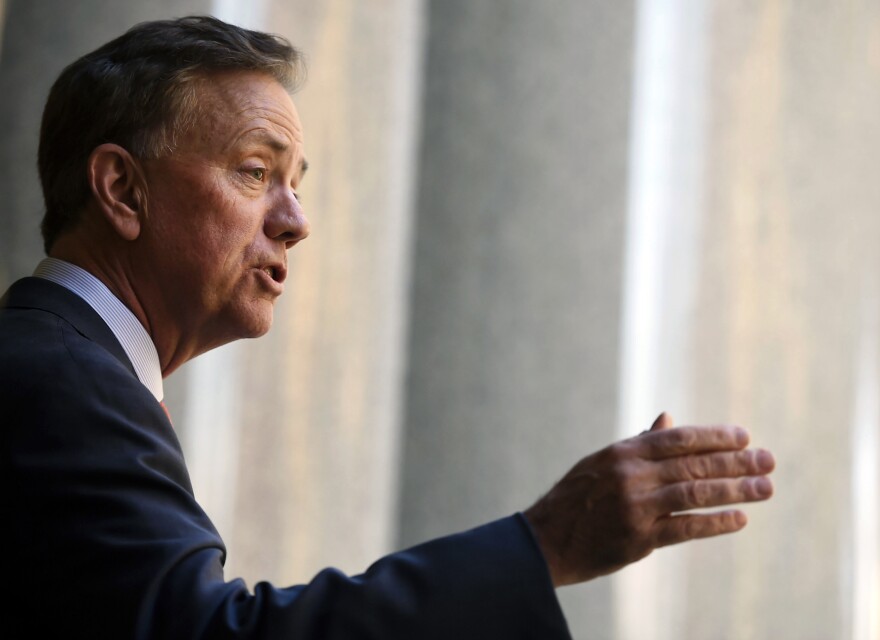Governor Ned Lamont has signed an executive order for Connecticut to take action on climate change. Parts of the order mimic the Transportation and Climate Initiative, which failed to get passed in the Connecticut legislature this year.
The executive order builds programs to overhaul road and storm water infrastructure, prioritizes renewable energy and electrifies public transit and reduces carbon emissions. It would eventually be funded by an incoming wave of federal infrastructure spending.
“Democracies are slow to act but we actually get it right,” Lamont said of his executive order. “I'd like to think Connecticut is getting it right here. I'm really proud to be signing this executive order. I'm proud that the state government is leading by example.”
Earlier this year, Connecticut legislative leaders failed to bring the Transportation Climate Initiative to the floor for a vote after Republicans and gas utility companies lobbied against a requirement of the plan that requires gas suppliers to buy carbon credits for contributing to excess pollution.
The goal of the initiative is to reduce vehicle emissions by up to 25% over 10 years. But the initiative was compared to a “gas tax” on home heating customers and truck drivers at the pump. Carbon pricing is left out of the executive order.
Lamont said he wants to get done what the Legislature couldn’t — even if it means the state will have to borrow money to fund these climate programs without that additional revenue from carbon pricing.
A special bond meeting is set for Tuesday.
“Connecticut's making a down payment, and we'll be able to leverage that tenfold with the infrastructure money,” Lamont said, referring to the $1.2 trillion federal infrastructure deal that was signed by President Biden last month.
House Republican Leader Vincent Candelora blasted Lamont for leaving out legislators. He called for Democrats in his party to reign him in.
“This is pandering in its truest form,” Candelora said. “Governor Lamont is going around the General Assembly by installing concepts that failed to make it through the committee process, all in a bid to appease the frustrated environmentalists in his political base.”
A recent study found that most of Connecticut’s climate-related bills die in legislative committees because of energy industry lobbyists who outspend environmental organizations.
“We are not that chummy,” Lamont said about lobbyists. “I am not their best friend. “
Instead of legislatively, Lamont’s order overlaps environmental, transportation and public health objectives within his administration to protect residents where flooding and air quality issues are most severe.
It also addresses over 60 recommendations from the governor’s Council on Climate Change in January to work fast to respond to accelerating impacts of rising tides and extreme weather. Officials pointed to summer heatwaves and local smog from wildfires burning the Midwest and heavy rains from the remnants of Hurricane Ida in early September that flooded streets and cars causing loss of property — and life — in New York City.
The state’s Greenhouse Gas Inventory Report also shows that emissions from the transportation and building sectors are increasing, and that the state is not on track to meet its 2030 target of reducing carbon emissions by 45%.
Part of the order electrifies public transportation across the state, where gas-powered cars, trucks and trains make up 40% of air pollution in Connecticut. It disproportionately impacts the health of low-income and communities of color who live close to major roadways.
“We know that the age of the automobile has accelerated climate change,” State Deputy Transportation Commissioner Garrett Eucalitto said, “and we need to do more to address that.”
Connecticut will also work to adopt landmark automotive emissions standards that began in California to reduce air pollution from carbon emissions, said Katie Dykes, the state’s environmental and energy commissioner.
“This executive order captures similarly impactful contributions and commitments from across all state agencies in the areas of building an infrastructure, clean transportation, community climate resilience, health equity and environmental justice jobs in the economy,” Dykes said. “We know that this is the crisis of our time, and it calls on all of us to get involved and get engaged.”
The state will also establish councils to ensure federal infrastructure dollars and state funding is spent with equity and environmental justice in mind. That means paying close attention to the public health of at-risk communities, said State Public Health Commissioner Dr. Manisha Juthani.
“The impacts of climate have a direct impact on health on a daily basis,” she said.



